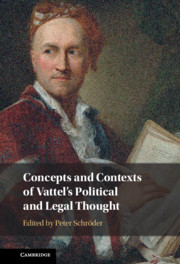Book contents
- Concepts and Contexts of Vattel’s Political and Legal Thought
- Concepts and Contexts of Vattel’s Political and Legal Thought
- Copyright page
- Contents
- Contributors
- Acknowledgements
- Concepts and Contexts of Vattel’s Political and Legal Thought
- Part I Historical and Intellectual Contexts
- Part II Concepts
- 6 Vattel, the Balance of Power, and the Moral Justification of War
- 7 Regular War, Irregulars, and Savages
- 8 Constitutionalism
- 9 Vattel’s Theory of the Social Contract
- Part III Receptions
- Index
- References
6 - Vattel, the Balance of Power, and the Moral Justification of War
from Part II - Concepts
Published online by Cambridge University Press: 11 June 2021
- Concepts and Contexts of Vattel’s Political and Legal Thought
- Concepts and Contexts of Vattel’s Political and Legal Thought
- Copyright page
- Contents
- Contributors
- Acknowledgements
- Concepts and Contexts of Vattel’s Political and Legal Thought
- Part I Historical and Intellectual Contexts
- Part II Concepts
- 6 Vattel, the Balance of Power, and the Moral Justification of War
- 7 Regular War, Irregulars, and Savages
- 8 Constitutionalism
- 9 Vattel’s Theory of the Social Contract
- Part III Receptions
- Index
- References
Summary
Vattel stands among the principal jurists of modern international relations. Yet the balance of power – a policy at the heart of the theory and practise of international relations, and which Edmund Burke, for example, declared central to the ‘common law of Europe’1 – hardly figures at all in Vattel’s magnum opus. The question thus arises: why does it play a relatively insignificant role in his writings, and what role exactly does he think it plays? There is no doubt that he recognises it as an important element of policy in European relations. While the condition of a balance of power ideally maintains peace and harmony among states, it also carries within itself a powerful justification for preventive war. Balance of power is defined by the principle of collective security that prevents any states from attaining a preponderance of power and constituting a danger to the rest. Yet while this dynamic may ultimately limit the occurrence of war, as just war theory more generally seeks to do,2 any attempt to wage war to preserve the balance of power is predicated on the institutionalisation of war as an instrument of policy. Vattel is thus sceptical of its efficacy as a reliable mechanism for the limitation of war. Whoever ‘entertains a true idea of war … and considers its terrible effects’, Vattel writes, would surely agree that it should not be undertaken unless for the best of reasons (LN, III-iii-24).
- Type
- Chapter
- Information
- Concepts and Contexts of Vattel's Political and Legal Thought , pp. 123 - 140Publisher: Cambridge University PressPrint publication year: 2021

